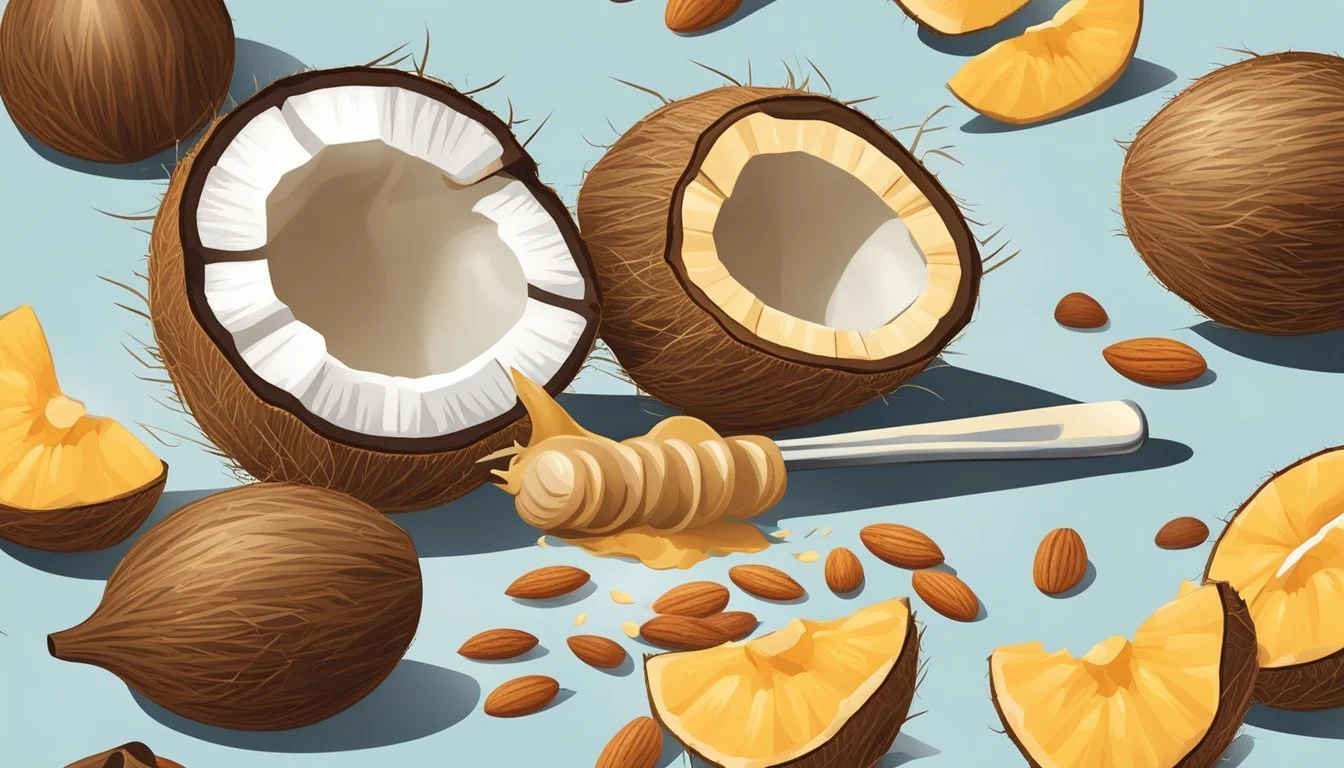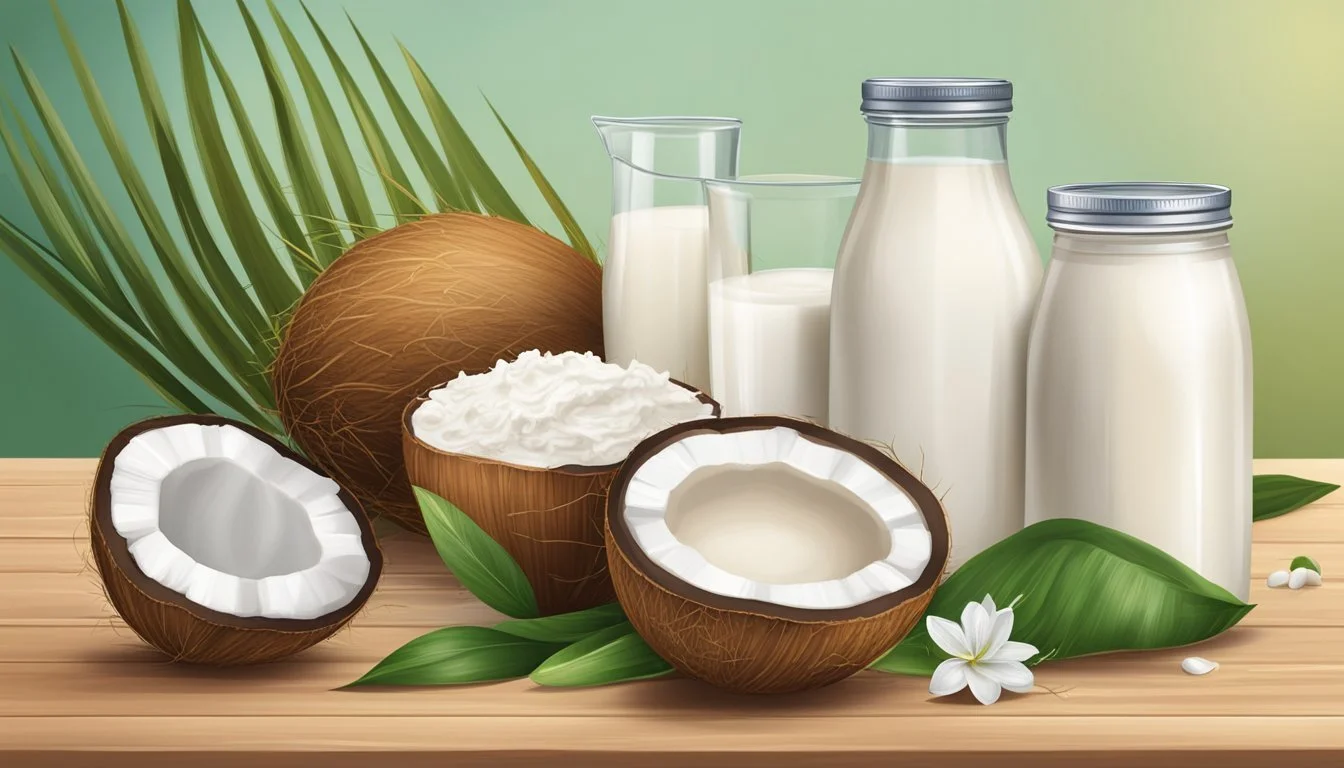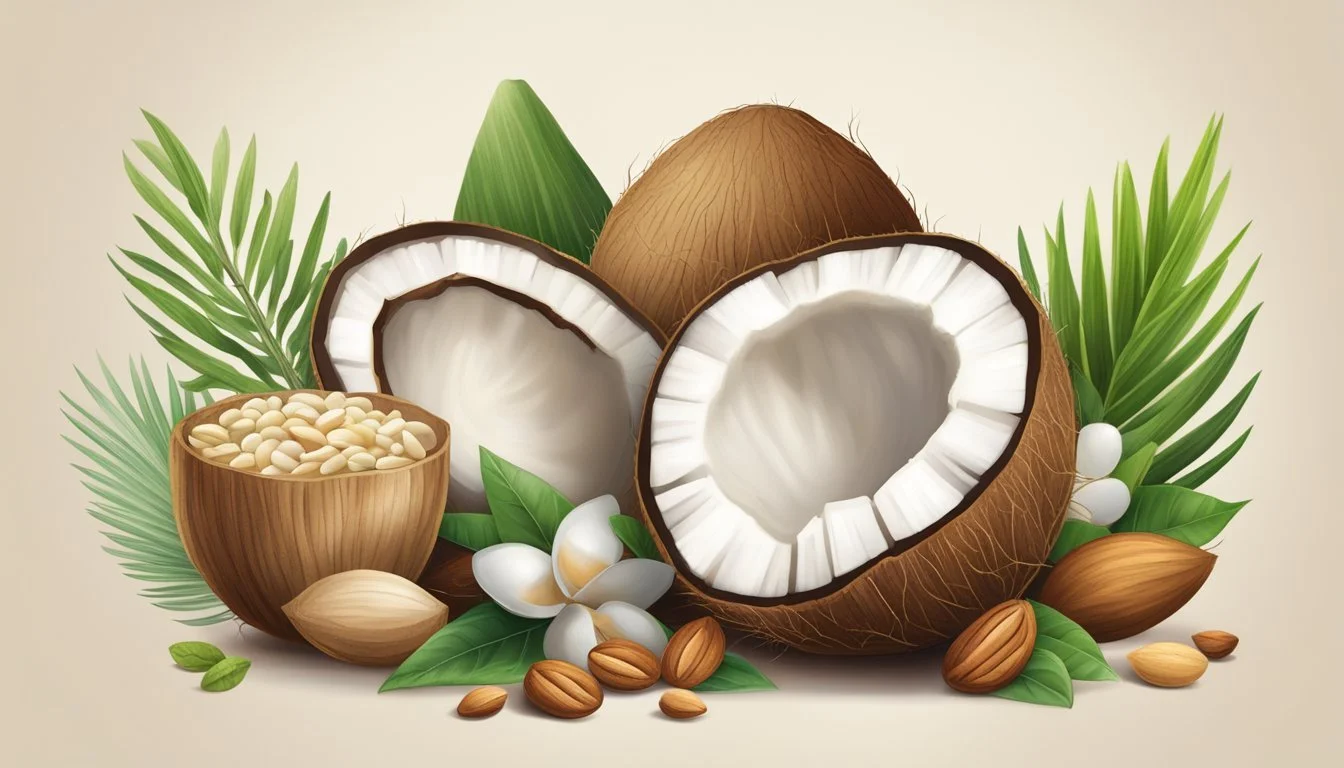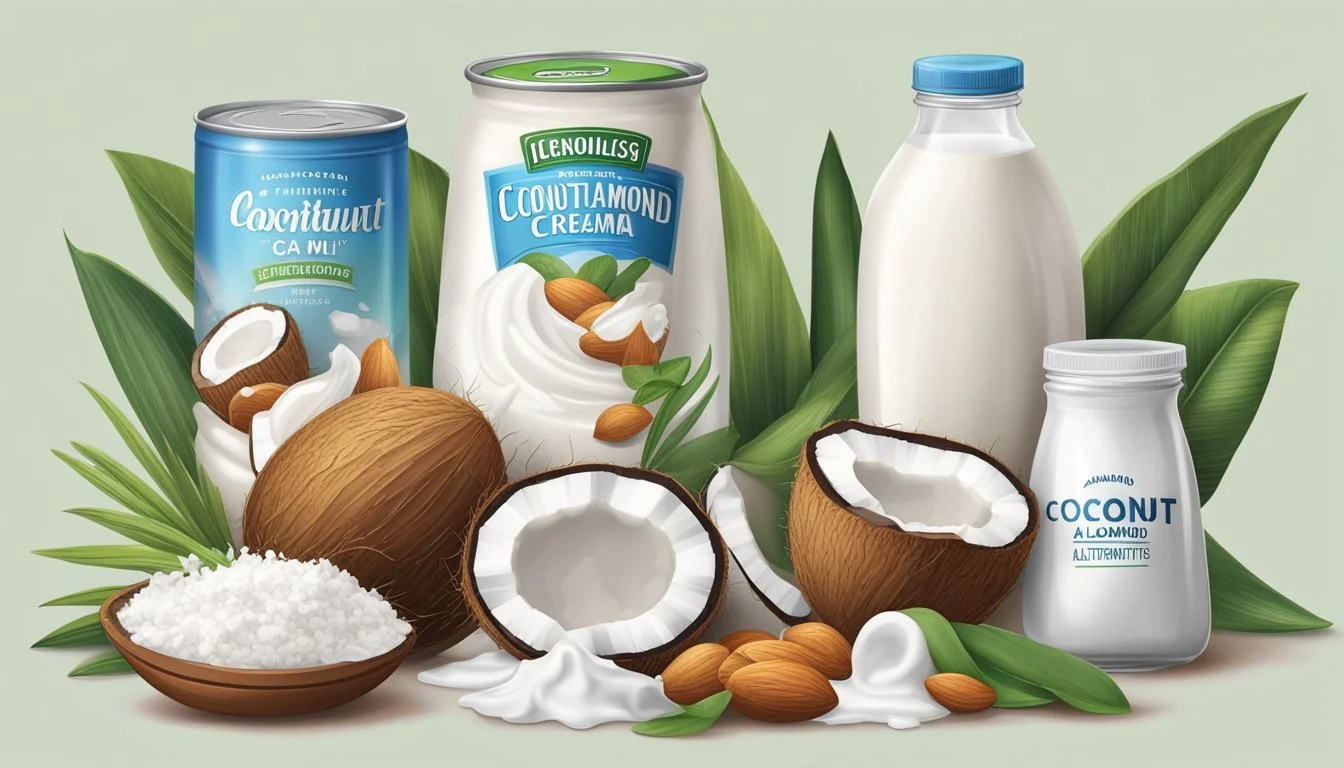Coconut Cream Substitutes
Top Alternatives for Your Recipes
Coconut cream is a staple in many culinary traditions, valued for its rich texture and distinctive tropical flavor. It forms the creamy base of a variety of dishes ranging from curries and soups to desserts and beverages. However, for those who need a substitute due to dietary restrictions, personal health choices or simply the lack of coconut cream in their pantry, there are several viable alternatives that can mimic the cream's primary characteristics in both cooking and baking.
Substitutes such as Greek yogurt and heavy cream can offer a similar thickness and richness to dishes. Greek yogurt brings a tangy profile to the mix while providing a protein-rich, lower fat option compared to the typical fat content of coconut cream. For a non-dairy alternative, nut butters thinned with water or pureed silken tofu could serve as sufficient replacements, contributing to the creamy texture needed in recipes. These substitutes accommodate various dietary preferences while ensuring the desired consistency in culinary creations.
In cases where the unique flavor of coconut is sought, one might consider adding a splash of coconut milk fortified with a bit of cornstarch to achieve the desired thickness. For those seeking healthy plant-based options, oat milk may be appealing due to its nutritious profile and thick consistency, which is suitable for vegan and dairy-free recipes. The diversity of substitutes offers cooks and bakers the flexibility to adapt recipes to meet nutritional requirements and taste preferences without compromising on the quality and flavor of the final dish.
Understanding Coconut Cream
Coconut cream is a thick, rich liquid made from the meat of mature coconuts. It's prized for its high fat content and velvety texture, making it a key ingredient in many cuisines, particularly in tropical and Asian dishes. Its creamy consistency makes it ideal for thickening curries and desserts.
One can distinguish coconut cream from coconut milk based on its thicker consistency and higher fat content. While coconut milk is produced by mixing grated coconut meat with water, coconut cream is less diluted, allowing it to impart a more flavorful impact on dishes. It's worth noting that coconut cream, when incorporated into recipes, can enhance the overall richness of the meal.
When considering dietary needs, coconut cream is naturally dairy-free, making it a popular choice for those with dairy restrictions or for individuals following a vegan lifestyle. It provides a creamy texture without relying on animal products, which is valuable for those seeking plant-based alternatives without compromising on taste or richness in their cooking.
The use of coconut cream can be quite versatile:
Curries: Provides a thick, creamy base
Desserts: Adds flavor and richness
Soups: Delivers a smooth, velvety consistency
Despite its dairy-free status, users must exercise caution when integrating coconut cream into hot recipes as improper handling can lead to separation or curdling. It's best added towards the end of the cooking process to avoid these issues.
Why Substitute Coconut Cream?
Substituting coconut cream can be a practical choice for addressing dietary restrictions, health considerations, and issues with availability. By exploring alternative options, one ensures that dietary needs are catered to while maintaining the desired culinary results.
Dietary Restrictions and Allergies
Dietary Restrictions: Various dietary plans and ethical choices, such as veganism, necessitate the exclusion of animal products. Plant-based alternatives to coconut cream are essential for those following such diets. These options include nut butters with water, soy-based products like silken tofu, and dairy-free milk, such as almond or soy milk thickened with a thickening agent.
Allergies: Coconut cream may not be suitable for individuals with allergies to coconut or related products. In such cases, allergy-friendly substitutes remain pivotal. Dairy-based options like heavy cream may serve well for those not allergic to dairy. For a coconut-free, dairy-free option, oat or rice cream can be utilized.
Health Considerations
Calories and Fats: For those monitoring their calorie and fat intake, the typically high calorie and saturated fat content of coconut cream might be a concern. Alternatives such as Greek yogurt or lower-fat dairy options can provide a balance by offering fewer calories and varying fat contents.
Micronutrients: Some consumers prioritize coconut cream substitutes that offer similar nutritional benefits, such as protein, calcium, magnesium, vitamin E, phosphorus, iron, and fiber. Selecting a substitute like Greek yogurt can provide a boost in protein and calcium, while pureed sweet potato offers fiber and vitamin E without compromising on texture.
Availability and Convenience
Availability: Coconut cream might not be readily available in all regions or stores. In such scenarios, readily available substitutes like canned coconut milk, which can be found in most grocery stores, become a viable option. By adding a thickening agent to the milk, one can achieve a consistency similar to that of coconut cream.
Convenience: Making homemade coconut cream by blending dried coconut with water can also be an accessible alternate for those unable to procure the canned variety. This approach allows individuals to tailor the consistency and flavor to their specific preferences.
Dairy-Based Substitutes
Dairy-based alternatives offer a richness and creaminess that can closely mimic coconut cream in various recipes. These substitutes are preferable when one desires the dense texture and mild flavor dairy products can provide.
Heavy Cream and Whipping Cream
Heavy cream and whipping cream serve as excellent dairy cream substitutes, especially for sauces and dressings, due to their high-fat content and rich texture. They are interchangeable in most recipes:
Heavy Cream: Ideal for imparting a thick consistency in savory dishes and desserts.
Whipping Cream: Slightly lighter than heavy cream, it can be whipped or added as is to recipes requiring a creamy element.
Greek Yogurt and Sour Cream
Both Greek yogurt and sour cream can be integrated successfully into baked goods and recipes where a tangy note is welcomed:
Greek Yogurt: Thicker and tangier than regular yogurt, offering a protein-rich substitute that enhances the texture in both sweet and savory dishes.
Sour Cream: It has a similar consistency to Greek yogurt with a distinctive sour taste, perfect for baking and creamy entrees.
Evaporated Milk and Regular Milk
Evaporated milk, with its reduced water content, and whole milk can be used if a lighter substitute is needed:
Evaporated Milk: It provides a concentration of flavor and creaminess without the fat content of heavy cream, fitting for soups and baking.
Regular Milk: Less dense but can be adapted using thickeners for a creamier consistency, suitable for a wide range of recipes.
Plant-Based and Non-Dairy Alternatives
When looking for an alternative to coconut cream, various plant-based and non-dairy options are available that cater to dietary restrictions and provide a comparable flavor and texture to traditional coconut cream.
Coconut Milk and Cream of Coconut
Coconut milk: A lighter substitute, it can lend a creamy texture to soups and curries without overpowering other flavors. Cream of coconut: Sweeter and thicker, it's more suited for desserts where a rich coconut essence is desired.
Almond Milk and Cashew Cream
Almond milk: With a subtle nutty flavor, it is often used when a milder taste is needed. Homemade cashew cream, made by blending soaked cashews with water, offers a rich texture ideal for sauces and creamy dishes.
Soy Milk and Soy Cream
Soy milk: It's a versatile staple for dairy-free diets, working well in both sweet and savory contexts. Soy cream, derived from soy milk, can be thickened with low-fat yogurt to create a richer consistency similar to traditional creams.
Oat Milk and Rice Milk
Oat milk: Well-regarded for its thick consistency and neutral taste, making it a favorite in baking and as a base for homemade creams. Whereas rice milk is thinner and often used as a lighter option in cooking.
Silken Tofu and Nut Butters
Pureed silken tofu, unsweetened and blended to a smooth consistency, serves as a high-protein, low-fat cream base. Nut butters offer a dense, creamy texture combined with a distinctive taste that complements spices and bold flavors.
Tahini and Other Seed Pastes
Tahini: Made from sesame seeds, it provides a rich, slightly bitter flavor profile that works especially well in Middle Eastern dishes. Other seed pastes can also be used to adjust the flavor intensity and creaminess of a dish.
Flavors and Textures of Substitutes
When seeking alternatives for coconut cream, flavor and texture are pivotal characteristics to consider. The right substitute not only complements the dish in terms of taste but also mirrors the rich consistency of coconut cream.
Heavy Cream: It's known for its rich, mildly sweet flavor and thick, velvety texture. In curry or other savory dishes, heavy cream adds a luxurious feel without the distinct coconut flavor, making it a noteworthy choice.
Greek Yogurt: This alternative brings a tangy flavor and a creamy consistency that can enhance the sensory profile of dips and baked goods. For those requiring a milder tang, it may be introduced at the end of cooking to maintain its textural integrity.
Evaporated Milk: Offering a somewhat caramelized flavor due to its reduced water content, evaporated milk possesses a concentrated richness and can provide a creamy element to savory dishes, albeit thinner than coconut cream.
Substitute Flavor Profile Consistency Heavy Cream Mildly sweet Thick and velvety Greek Yogurt Tangy Creamy, less thick Evaporated Milk Caramelized, sweet Creamy, thinner
Each substitute brings its unique properties to a dish. When substituting, one should consider how the flavor profile and consistency will interact with other ingredients, ensuring a harmonious result in both flavor and texture.
Homemade Coconut Cream Recipes
When a recipe calls for coconut cream, the silky texture and tropical flavor are essential. For those preferring to make their own at home, here are reliable recipes to create homemade coconut cream.
Basic Coconut Cream To prepare basic homemade coconut cream:
Start with 4 cups of shredded unsweetened coconut.
Boil 4 cups of water, then let it cool slightly.
Add the coconut to the water in a blender, ensuring it’s still warm.
Blend on high speed for several minutes until the mixture is creamy and smooth.
Use a cheesecloth or a fine-mesh strainer to strain the mixture, pressing to extract as much liquid as possible.
The resulting thick liquid is your homemade coconut cream. It can be refrigerated, and upon cooling, it will thicken further.
Concentrated Coconut Cream
For a thicker consistency:
Repeat the straining process with the already strained coconut mixture.
Return the liquid to the blender and blend again until it becomes even thicker.
The key ingredient, shredded unsweetened coconut, is paramount for an authentic flavor.
Remember: The difference between coconut milk and coconut cream is the concentration and fat content. Coconut cream is richer and thicker, which can be achieved by reducing the water content in your homemade recipe.
These homemade recipes offer a natural and preservative-free alternative for those looking to replace store-bought coconut cream in their cooking and baking endeavors.
Considerations When Replacing Coconut Cream
Replacing coconut cream in a recipe requires careful consideration. Flavor, consistency, and the end product's desired outcome are key factors to keep in mind.
Flavor Match: Coconut cream imparts a tropical, sweet flavor that is not easily replicated. Depending on the dish, one might consider how a substitute will change the overall taste profile. Greek yogurt, for instance, introduces a tanginess, while heavy cream adds a richness without any distinct flavor.
Consistency: Coconut cream is thicker than regular milk or cream. Substitutes like evaporated milk or heavy cream are closer in consistency but may require adjustments in quantity to achieve the same thickness or creaminess. For example, silken tofu or pureed sweet potato can be used to reach a similar density.
Recipe Suitability: Some substitutes may alter the final texture of a dish. In baking, where coconut cream’s fat content helps achieve a certain moisture, using a low-fat option such as almond milk may not yield the same results. To maintain an organic integrity in recipes, one must choose organic substitutes like organic Greek yogurt.
Dietary Restrictions: If a recipe is originally dairy-free, using a dairy-based substitute like yogurt or sour cream will not suffice for those avoiding dairy. In such cases, plant-based alternatives like blended silken tofu or a coconut-based yogurt may be suitable.
Substitute Ratio Notes Blended Sweet Potato 1:1 Mimics thickness, slightly sweetens the dish. Evaporated Milk 1:1 Creamier texture, adjust seasoning as needed. Pureed Cauliflower 1:1 Maintains creaminess, neutral flavor. Greek Yogurt 1:1 Adds creaminess with a tangy flavor. Silken Tofu 1:1 Dairy-free, blends smoothly into recipes.
In conclusion, when seeking a coconut cream substitute, one should not only account for the consistency and flavor of the alternative but also how it aligns with the dietary needs and the nature of the recipe itself.
Nutrition and Calories in Coconut Cream Substitutes
When considering alternatives to coconut cream, it's important to understand their nutritional profiles and caloric content, as these can vary significantly. Below is a list of common substitutes with key nutritional aspects highlighted.
Coconut Milk: Though lower in calories than coconut cream, coconut milk provides a similar flavor. One can reduce its thin consistency by using thickeners.
Nutrients Per 100g Calories 230 Protein 2.3g Fiber 2.6g
Heavy Cream: High in calories and fat, heavy cream is a dairy-based substitute that offers a rich texture. It can replace coconut cream in most recipes at a 1:1 ratio.
Nutrients Per 100g Calories 345 Protein 2.1g Fiber 0g
Greek Yogurt: A healthier substitute with fewer calories, Greek yogurt contains more protein than coconut cream. Its addition at the end of cooking helps prevent curdling.
Nutrients Per 100g Calories 59 Protein 10g Fiber 0g
Nut Butters: When mixed with water, nut butters can serve as a creamy alternative with added protein and healthy fats, albeit higher in calories.
Nutrients Per 100g Calories 588 Protein 20g Fiber 6g
Substitutes should be chosen based on dietary preferences and recipe requirements. Note that the caloric and protein content can be crucial for those tracking their diet carefully. Fiber, although not as prominent in creamy substitutes, plays a role in digestive health, while the calorie count is an indication of energy content.






